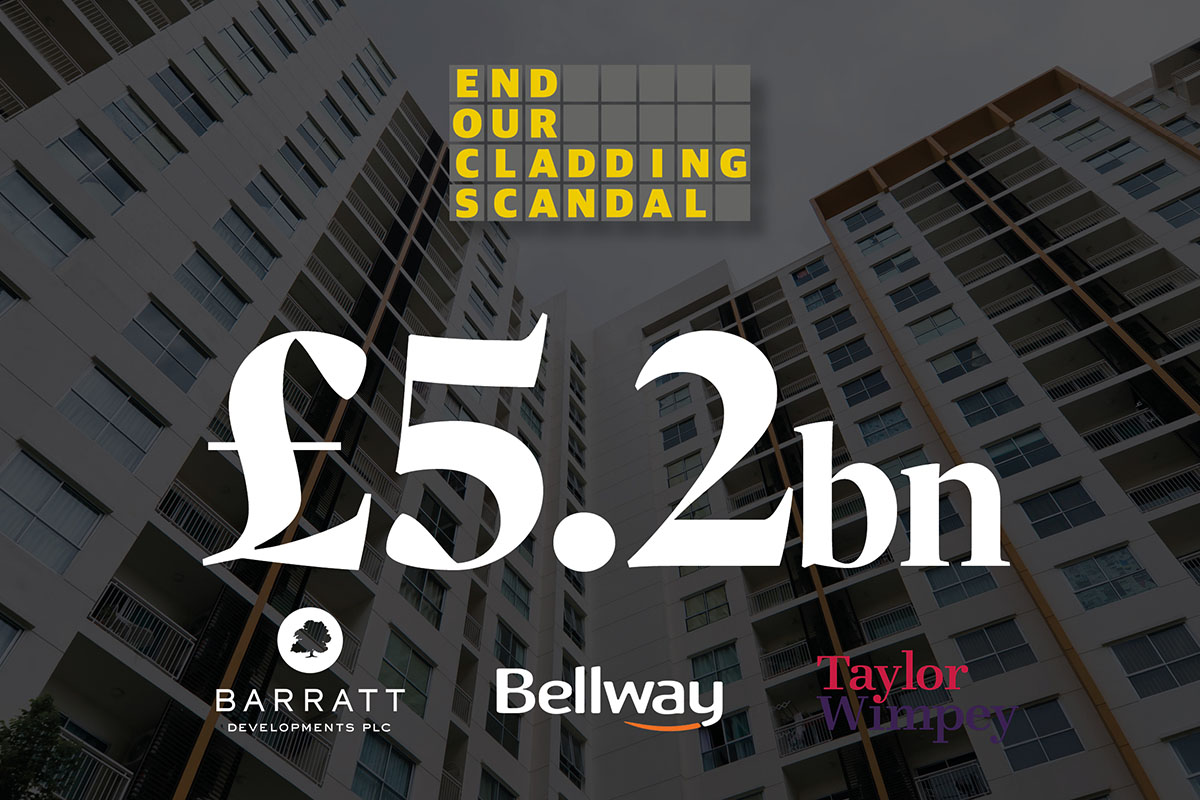You are viewing 1 of your 1 free articles
Help to Buy leaseholders can only sell homes with cladding at ‘unaffected market value’
The agency that runs the country’s Help to Buy programme has advised residents living in blocks with dangerous cladding that they can only sell at a price that does not take into account the materials on the outside of the buildings, Inside Housing can reveal.
Inside Housing has seen correspondence between a Help to Buy leaseholder and Homes England in which he is told that they can only sell at the “prevailing market value” and at a price level as if the cladding issues does not exist.
The letter also bars the leaseholder, who preferred not to be named, from taking a larger equity stake in the property at a reduced cladding impacted value.
The confirmation of Homes England’s position comes as hundreds of thousands of leaseholders up and down the country have seen the price of their property drastically reduced due to cladding issues.
A number of those leaseholders would have bought their flats through the Help to Buy scheme.
The correspondence, seen by Inside Housing, was sent to the leaseholder living in an eight-storey block in Southwark after months of correspondence with Target, one of Homes England’s administrators for the Help to Buy scheme.
Last year, the block was found to have aluminium composite material cladding (ACM) that is slightly different to the material found on Grenfell Tower and the exact same Celotex RS5000 insulation which was also found on the tower. Earlier this year, the combination failed a fire safety test and it was deemed that remedial works were needed to remove the cladding and insulation.
The leaseholder and his partner decided to move to the Midlands in order to get a bigger property as well as start a family and move closer to his partner’s mother who had become ill. However, they soon realised the difficulty in selling a flat in a block that has dangerous materials.
The leaseholder arranged a surveyor to carry out a valuation of the property. Due to the cladding issues, the surveyor said their home was worth £200,000. A second valuation carried out by Savills and commissioned by Homes England’s Help to Buy administrator Target, valued the home at £375,000. Both valuations were well below the ‘unaffected market value’ of between £425,000 and £430,000.
However, after asking whether he could sell the home at the value given by Savills, Homes England said it would only allow the property to be sold for £425,000 or above the unaffected market value.
In the letter, Homes England said the sale must meet all covenants and that these covenants should include a requirement on the borrower that the block meets building regulations at the time of sale and that it was the leaseholder and freeholders responsibility for this.
Homes England added it would not be providing advice on whose responsibility it is to remediate the cladding and that the buyer’s solicitors should have advised him on this at the time of purchase.
The buyer also attempted to staircase to buy a higher equity stake in the property at the reduced £200,000 price given by Hamblin Sullivan Associates.
However, this was rejected by Homes England. The body told the leaseholder that for buildings affected by cladding, it reserves the right to agree a valuer which is certified by the Royal Institution of Chartered Surveyors with the leaseholder before they are instructed.
It also said that staircasing on the basis of the £200,000 valuation would be invalid because the leaseholder had not applied to Target before the valuation, but instead had only called them to instruct them of his actions.
In 2018, Homes England agreed to virtually wipe out Help to Buy loans on a flat in the New Capital Quay development in Greenwich after the presence of Grenfell-style cladding caused the value of the flats drop from £500,000 to £50,000. This saw a leaseholder have to pay only £10,000 of the £85,000 loan she had taken out, due to her being able to redeem Help to Buy loans on the value of the property rather than value of original loan.
This led to fears that the government could lose millions due to leaseholders living in affected blocks redeeming their loans at a fraction of the price. However, that has yet to materialise.
According to government statistics, there are 274 Help to Buy Homes affected by ACM cladding, with 104 homes redeeming their loans. Homes England received less than the original loan in 27 cases.
Unable to sell of staircase, the leaseholder tried to buy a new property alongside his Help to Buy Home, but this was blocked due to rules around Help to Buy homeowners being barred from owning a second home.
The leaseholder is now renting a property that is near his partner’s mother and Target has allowed him to sub-let his property in the interim period.
A Homes England spokesperson said: “Homes England is sympathetic to the concerns of any borrowers dealing with cladding issues, although we cannot comment on individual cases.
“Borrowers can apply to redeem their Help to Buy equity loans, through our mortgage administrator.
“Homes England generally uses the unaffected value for purpose of redeeming loans, but we always take into account the specific circumstances which can potentially result in a different valuation being used.
“As the lender, we cannot advise borrowers on remediating unsafe cladding, which is a matter between the borrower and their freeholder.”











